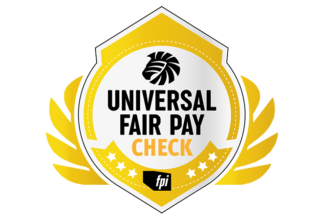Universal Commitment for Fair Pay: Panic and Privileges
Best Practice, Current, Economics & Business, Fair Pay Management Circle, General, Hauptmenü /
Fair Pay Management Circle at the ESMT Berlin and on the screen
After a lengthy break, on October 22, 2020, we were finally able to get going once again, hosting exclusive discussions with experts from industry, academia, and politics at a Fair Pay Management Circle in Berlin. There were also insights into best practices from Switzerland and Iceland, as well as the starting signal for our UNIVERSAL FAIR PAY CHECK. Then the next day, all of this was shared again via our very first Digital Follow-up Circle with everyone who had been unable to travel.
All around the globe, the topic of fair pay is moving higher up both corporate and political agendas – especially in these times of crisis. But exactly why is fair pay so decisive for a sustainable corporate future? Why does closing the gender pay gap have such a positive effect on other areas of business? And how can a fair pay strategy be implemented regardless of local legislation?
These were the burning questions we discussed on October 22 at the Fair Pay Management Circle at the European School of Management and Technology (ESMT) in Berlin, and we also recapped the answers to these questions at a Digital Follow-up Circle the following day.
Tomorrow’s senior managers
On Thursday, host Jörg Rocholl greeted the exclusively invited guests and emphasized how important the theme of fair pay was at the ESMT: “Today’s students are tomorrow’s senior managers.” Students from over 70 countries study at the ESMT. One of the main focal points is to actively encourage women into next-generation management. To this end, the ESMT collaborates with several companies and offers specific scholarships.
On both days there were insights into best practice from experts from Switzerland and Iceland respectively. Marcus Priest from Novartis International AG and Lúvísa Sigurðardóttir from Landspitali know exactly how fair pay works in international practice and reported on the implementation of payment strategies in their respective companies.
The first round of awards
In addition, the Universal Fair Pay Check was presented. This certification process unites the best equal pay initiatives from Iceland, the UK, and Switzerland within one single procedure and can be implemented in every company worldwide, irrespective of size, location, or organizational form. The first round of awards began with 6 pilot companies of varying sizes, including Allianz Deutschland AG, esentri AG, the concert agency MCT and digital enabler Rheingans GmbH, as well as the two fair pay trailblazers in Iceland Reykjavík Energy and Landspítali – the National University Hospital of Iceland.
As Quality Director for Equal Pay, Lúvísa Sigurðardóttir has been spearheading the process toward fair pay at the Landspitali since 2018. She faced strong reservations and resistance at first, with some initial panic and fears about loss of privileges, however, the theme has now found resonance with employees. This is because the result is a newly-found diversity which is of benefit to the entire company as a whole. In the meantime, everyone wants a man on the team, however, men are still a scarce commodity in the care sector. The starting point was initially the analysis of data availability: “you can‘t manage what you don’t measure“, stressed Sigurðardóttir. Good planning is the most important prerequisite for implementation, which had to happen at the Landspitali within an extremely short time period – as a result of the strict legislation imposed across Iceland within one year. The biggest challenge: to determine and measure the equivalency of various activities.
Strong commitment to Equal Pay
At Novartis, where the process toward fair pay has been in progress for several years, there were no legislative deadlines looming. “The biggest incentive”, says Marcus Priest, Global Head of Reward, “was the external equal pay obligation.” The biotechnology and pharmaceutical company has long been an advocate of fair pay, but it has only been a member of the newly-founded Equal Pay International Coalition since 2018. Since the objective has been clear and also very clearly communicated externally, there is no longer any tedious internal debate about the pros and cons. The managerial level has unequivocally committed itself to equal pay, which in itself is a fixed component of continuous management training. Nonetheless, it has become apparent that the objectives are far from being achieved, with the whole issue being understood as work in progress. The corporate culture is ready for the next step in 2021: increased pay transparency.
Those also wishing to follow the examples set by Novartis and Landspitali can apply immediately for the first round of Universal Fair Pay Checks. FPI founder and CEO Henrike von Platen is certain that this marks “a historic day”. “The time has finally come to see all pay gaps as KPIs. That’s a small step for companies, but a giant leap for equal pay.”
The one-hour Digital Follow-up Circle was recorded and can be watched on YouTube until 31 January 2021: https://youtu.be/5RnZQz2H33w
UNIVERSAL FAIR PAY CHECK
The easy way to fair pay: Regardless of local legislation and the corresponding test methods, the size of the company or the form of the organisation. In every company worldwide.
LEARN MORE
Companies
Knowing about the pay gap and being willing to rid the world of the unjust state of affairs are evidently not enough to actually ensure fair pay. It is right here ...
LEARN MORE
Best Practice wanted
We are firmly convinced that pay equity could be possible tomorrow – if everyone wanted it. That is demonstrated by those companies where things are already fair(er).
LEARN MORE



